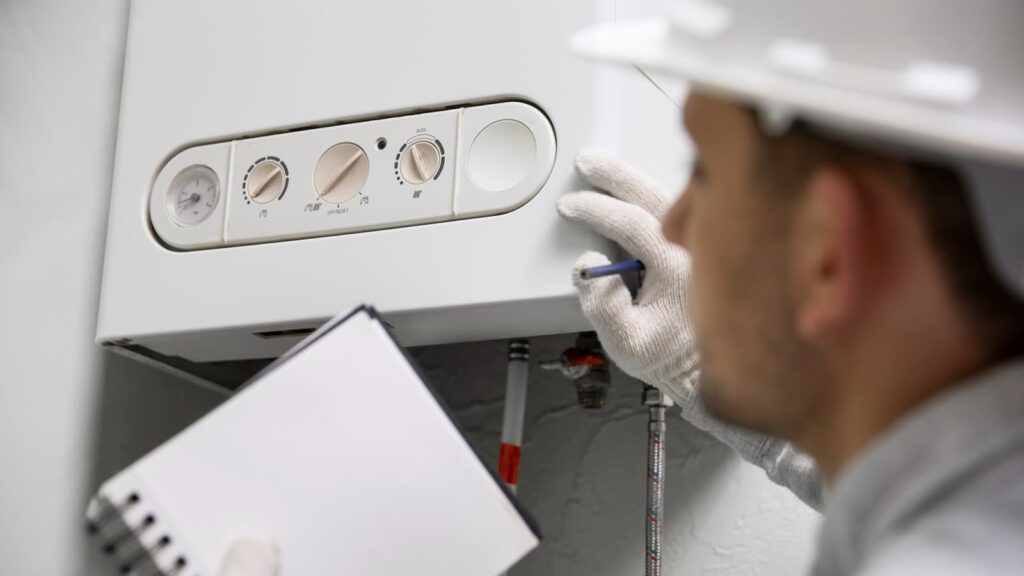Gas Leak: Why It Happens and What to Do
Gas leaks are a serious safety hazard that can lead to devastating consequences if not addressed promptly. From explosions and fires to health complications…

Are you tired of running out of hot water during your shower or bath? Tankless water heaters could be the solution you’ve been looking for. Unlike traditional tank-style water heaters, tankless systems offer an endless supply of hot water on demand, providing convenience and energy efficiency.
Learn more about the benefits of tankless water heater and discover how they can save you money while ensuring you never have to take a cold shower again.
An electric tankless water heater is a heating device that replaces the traditional tank-type water heater typically found in a furnace room or basement. Unlike conventional water heaters that store heated water in a tank, tankless water heaters only heat water when it’s needed. This on-demand heating method provides several benefits over traditional water heaters.
Tankless water heaters heat water instantaneously without the use of a storage tank. When a hot water faucet is turned on, cold water flows through a heat exchanger in the unit, and either a natural gas burner or an electric element heats the water.
There are three energy types for tankless water heaters: natural gas, electric, and propane. The best option for you depends on what you’re buying the tankless water heater for.
Electric tankless water heaters use high-powered electric heating elements to heat water on demand. They are often more energy-efficient than traditional tank-style electric water heaters but may cost more upfront.
Gas tankless water heaters are powered by natural gas or propane. They tend to have a higher heating capacity than electric models and are often more energy-efficient than electric units. However, they require a gas line or propane tank for installation.
Propane-powered tankless water heaters are similar to gas models, but they use propane instead of natural gas as the fuel source. This can be useful in areas where natural gas is not readily available.
Tankless water heaters provide hot water on demand, making them more energy-efficient than traditional-style storage tank water heaters. Coldwater travels through the tankless unit and is heated using gas or electricity, providing a hot water supply that will last until you turn off the tap.
Tankless water heaters can be up to 34% more efficient than a conventional storage tank-type water heater, which can save the average family $100 per year.
Tankless systems provide a continuous supply of hot water, eliminating the need to wait for a tank to refill and reheat.
Tankless water heaters are much smaller than traditional tank-style models, freeing up valuable floor space in your home.
The increased energy efficiency of tankless water heaters can lead to lower monthly utility bills and also be eligible for tax credits.
Tankless water heaters typically last 20 years or more than 10-15 years for traditional tank-style models.
Tankless water heaters generally have a higher initial purchase price compared to traditional tank-style models.
Hot water may take a few seconds to reach the faucet, as the tankless unit needs to heat the water on demand.
Tankless water heaters may need help to keep up with high-demand situations, such as multiple showers running simultaneously.
Tankless water heaters require more maintenance than traditional tank-style heaters, such as regularly flushing the system to remove mineral buildup.
Depending on the tankless unit’s size and power requirements, you may need to upgrade your home’s electrical or heating and gas service to accommodate the new system.
Whether a tankless water heater is worth the investment depends on your specific needs and circumstances. If you value energy efficiency, a continuous supply of hot water, and long-term cost savings, a tankless system may be a wise choice. However, the higher upfront cost and potential capacity limitations should also be considered.
It’s essential to consult with a professional to assess your home’s hot water requirements and determine the best tankless water heater solution for your needs.
If you’re considering upgrading to a tankless water heater, it’s always a good idea to consult with a professional to ensure you choose the right model and size for your home. The team at TaskPro can help you evaluate your heating problems and provide expert guidance on the best tankless water heater solution. Contact TaskPro today to schedule a consultation and get started on your tankless water heater journey.
People often purchase tankless water heaters for their improved energy efficiency, endless hot water supply, space-saving design, and lower long-term operating costs. The ability to heat water on demand, rather than maintaining a constant supply in a tank, can lead to significant energy and cost savings for homeowners.
Whether a tankless water heater is worth the investment for your home depends on a variety of factors, including your family’s hot water usage, the size of your home, your energy costs, and your long-term plans for the property. In many cases, a tankless system’s energy savings and added convenience can justify the higher upfront cost, especially if you plan to stay in your home for several years.
Tankless water heaters can be a good choice for a variety of homeowners, including those who:
Installing a tankless water heater should be based on carefully evaluating your specific hot water needs, home layout, and overall budget.
Share this Guide
Gas leaks are a serious safety hazard that can lead to devastating consequences if not addressed promptly. From explosions and fires to health complications…
Septic tanks are a vital component of wastewater management systems, particularly in areas where municipal sewer systems are unavailable. These underground structures treat and…
Choosing the right toilet for your home is more than a simple decision; it’s an investment in comfort, efficiency, and functionality. The type of…